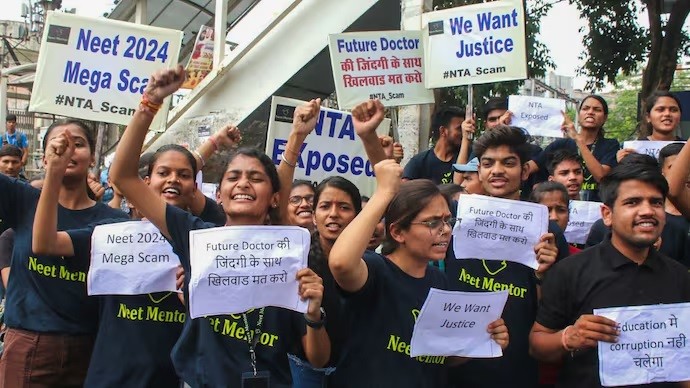22/06/2024
22/06/2024

NEW DELHI, India, June 22: India’s premier medical school and research program admission exams are facing intense scrutiny following mounting evidence of corruption and paper leaks, impacting the futures of over three million students.
The National Testing Agency (NTA), an autonomous body under India’s Ministry of Education, is at the center of these controversies, particularly over the integrity of the National Eligibility cum Entrance Test (NEET), a crucial exam for medical aspirants held last month. The June 4 results revealed irregularities in marks and an unusually high number of top scorers, prompting arrests across the country for alleged paper leaks and multimillion-dollar cheating scams.
In response to these irregularities, many students have approached the Supreme Court and state high courts, staged protests in the scorching heat, and launched social media campaigns demanding independent investigations and a re-examination. About 2.4 million candidates took the NEET, competing for 100,000 spots in medical schools.
On June 19, the government also canceled the National Eligibility Test (NET), which selects candidates for public-funded research fellowships, just a day after a million students took the exam. This decision followed reports that questions had been leaked on the darknet and circulated on Telegram, according to Education Minister Dharmendra Pradhan.
Pradhan did not specify how the paper was compromised but acknowledged the NTA's failure. "We are assuring that there will be a reform committee and action will be taken. We will not compromise on transparency. Students’ welfare is our priority," he stated.
Opposition leaders and legal experts have criticized the government for failing to address corruption in these elite exams. "The NTA literally has one job to do [to conduct exams] and it has failed miserably," said Rishi Shukla, a law research scholar in Lucknow who has aided multiple legal petitions against the NTA. "Millions of students’ careers and lives are at risk. The discrepancies in these examinations carry a smell of large-level corruption in the system."
The NEET results surprised many: 67 students scored a perfect 720 out of 720, up from two students last year. Two years ago, the highest score was 715 marks. This year, the candidate with that score ranked 225th. At least two students scored 719 and 718 marks, a statistically improbable result under the NEET's marking system, raising further doubts about the exam's integrity.
The NTA defended itself by stating that some students were awarded "grace marks" due to factors beyond their control that affected their exam time. However, the agency did not disclose the criteria for awarding these marks. Eventually, the NTA informed the Supreme Court that it would cancel the grace marks and conduct a re-test for the 1,563 affected students.
"There have been issues in the NTA’s conduct from the beginning of the NEET exams this year," said Shukla, who has demanded an impartial, court-monitored probe. "This agency was constituted in 2013 to centralize examinations and prevent lower-level paper leaks and corruption. However, now they have lost their face."
The NEET exam, which includes 180 questions in physics, biology, and chemistry, was held in over 4,500 centers across the country. In 2023, 304 students scored 700 marks or more, but this year that number rose to 2,100. High scores, previously sufficient for admission to government medical colleges, are now inadequate due to the rising candidate pool and the limited number of seats, which pushes students towards expensive private institutions.
Nineteen-year-old Pratibha, an aspirant from Odisha, expressed her distrust in the re-examination promised by the NTA. "This re-test is an eye wash because the government is clearly shielding corrupt people," she said. "I have spent my teenage years for this dream to wear the white coat. It all feels like a waste now. I have scored good marks but not the rank. My family does not have money to send me to a private college."
Last week, Education Minister Pradhan denied the possibility of a paper leak in the NEET. However, police in Bihar, where Pradhan’s Bharatiya Janata Party (BJP) rules as part of a coalition, claimed to have secured a confession from an arrested man who allegedly accessed the paper the night before the exam for nearly $36,000. Reacting to these findings, Pradhan said the ministry was in touch with the police and awaiting a detailed report, but rejected calls for a re-examination of the NEET.
In Gujarat, another BJP-ruled state, police revealed details of a scam involving private coaching centers, teachers, and exam supervisors. At least 30 students allegedly paid between $12,000 and $50,000 to clear the test. Five individuals have been arrested so far in this probe.
Amidst these revelations, Varun Choudhary, the national president of the National Students’ Union of India (NSUI), led protesting students to the residence of Education Minister Pradhan, where they were quickly dispersed by the police. Choudhary criticized the NTA and demanded the resignation of Pradhan.
The Supreme Court has criticized the NTA’s handling of the exams, stating, "If there’s even 0.001 percent negligence on anyone’s part, it should be thoroughly dealt with." However, it did not defer the post-NEET allocation of medical seats, scheduled for July 1. The next hearing in the case is on July 8.
Opposition leaders have also targeted the Modi government’s handling of the exams. Tamil Nadu Chief Minister MK Stalin and Kerala Chief Minister Pinarayi Vijayan criticized the federal government for inefficiency and mismanagement. Congress leader Rahul Gandhi and Samajwadi Party chief Akhilesh Yadav demanded a court-monitored probe.
The controversy over NEET and NET exams highlights the growing issues within India’s competitive exam industry, where intense pressure has led to rising suicide rates among students. Critics argue that the centralized exam system is failing, urging the government to consider alternative approaches.


